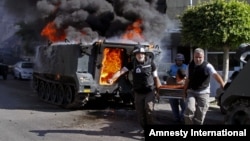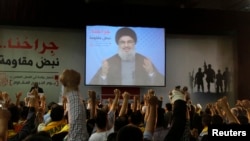BEIRUT —
For years, Lebanese have been saying that the Army was the only institution capable of holding the country together through its turbulent and sometimes bloody history.
This past week, the Army provided fresh support for those sentiments – and drew much praise - by routing gunmen from a radical Sunni group in the port city of Sidon, 40 kilometers south of Beirut.
But despite this latest success, most Lebanese are convinced the Army will be facing even bigger challenges very soon from sectarian fighting closely linked to the ongoing civil war in neighboring Syria.
The Lebanese Army’s immediate challenge is to keep the peace between the country’s Shi’ite and Sunni Muslims, who support opposite sides in the Syrian war.
Shi’ites, who are thought to be the slightly larger group, generally support Syrian President Bashar al-Assad and his followers, who are largely Alawites, an offshoot of Shi’ism. Lebanon’s Sunnis mainly support Syria’s anti-government rebels, who are also largely Sunnis.
Complicating the issue is Lebanon’s Shi’ite militia, Hezbollah, which is believed to be even more powerful than the nation’s 70,000-member army.
The latest skirmish
This week’s crackdown in Sidon, against supporters of Sunni cleric Sheikh Ahmad al-Assir, was just the latest skirmish in the Army’s effort to maintain order. The two days of heavy fighting left 17 soldiers and as many as 30 Sunni gunmen dead.
Many critics are saying the Army now needs to follow up with tougher action against all armed groups in the country. Some are even calling for the government to declare a state of emergency.
“I don’t know what the politicians are waiting for,” said retired general Hisham Jaber, who was a young Army officer in 1973 when a state of emergency was declared to deal with fighting between the Lebanon’s Muslim, Christian and Druze communities.
Jaber says the army was able to stabilize Lebanon back then, giving the nation’s politicians the breathing space to at least delay an all-out civil war, which eventually broke out two years later and left 120,000 dead after 15 years of fighting.
“We succeeded because we pushed the civil war back two years. And in 1973 the situation was not as bad as now,” Jabber said, adding: “Lebanon is in real danger and we have to expect war. Why are they waiting?”
Declaring a state of emergency would not be easy for Lebanon’s current leadership. The country has been governed by a fragile caretaker administration since scheduled elections were postponed because of a squabble over new electoral laws.
Even so, Jaber, the former military governor of Beirut, argues that a state of emergency is needed quickly so the Army can maintain order. Like most Lebanese, he believes it’s only a matter of time before the Syrian conflict spreads into his country and overwhelms it.
“If there are any dramatic changes in the Syrian civil war, a prolonged fight in Damascus or the sudden collapse of the Assad regime, the war will come to Lebanon,” Jaber said, drawing on a small cigar in his office in the Verdun district of Beirut.
War is spreading
On a limited scale so far, it already has.
Beside the latest battle in Sidon, there have been 17 incidents of serious fighting over the past year in Lebanon’s second largest city, Tripoli, between Sunni, Shiite and Alawite Muslims.
In the central Bekaa Valley, there has been an ominous increase in fighting, bombings and kidnappings. And across the country, many hardline Sunni clerics have been calling for a determined effort to push back on Shiites and bring Hezbollah under control.
The call to do something about Hezbollah came after the militia’s fighters spearheaded the Assad government’s capture of the strategic Syrian town Qusair near the border with Lebanon.
After the military’s crackdown in Sidon this week, Sunni Muslim leaders accused the Army of not being even-handed. Critics said the Army also did nothing to stop Hezbollah fighters and other Shi’ites from joining the fight in Syria – which they added undermined Lebanon’s policy of neutrality in the Syrian civil war.
Sunni Sheikh Salem al-Rafei lambasted this week the Army for its operations in Sidon, saying it was working hand-in-hand with Hezbollah. At a press conference following a meeting of Sunni clerics, al-Rafei warned: “We won’t intervene any longer to control the streets. Let the state be responsible for the conspiracy that some of its members are [carrying out] with Hezbollah.”
And it isn’t just Sunni hard-liners criticizing the Army. An editorial in the impartial Daily Star newspaper this week praised the crackdown in Sidon but also warned, “If the authorities fail to take a comprehensive approach now, they will be guilty of allowing the Army to fall into the trap of being seen as responding selectively, which only ignites similar incidents elsewhere.”
Politician Mostapha Allouch, a member of parliament for the opposition Future Movement, a moderate Sunni party, said sectarianism is corroding the Army. “The Lebanese Army is perceived to turn a blind eye to Hezbollah’s behaviors and often conspires with the party and their local allies against Sunnis,” he said.
Army dismisses criticism
Army commanders dismiss the accusation, saying they are even-handed and that Hezbollah has not been attacking the Army or seeking to provoke sectarian warfare in Lebanon.
“The Lebanese Army is united and has not assaulted any specific sect,” said the Army’s chief, General Jean Kahwaji. “The army responded to an armed group that intentionally and purposefully attacked it.”
Retired Army general Jaber notes that there have not been any desertions from the Army recently and says this is evidence that it is not siding with one religious group or the other.
At the beginning of Lebanon’s civil war in 1975, the Army disintegrated as soldiers deserted to join militias of their respective religious communities.
But even though the Army has remained intact so far, Jaber concedes that if full-scale sectarian fighting does erupt again in Lebanon, the Army could once again face wide-spread desertions and fall apart.
This past week, the Army provided fresh support for those sentiments – and drew much praise - by routing gunmen from a radical Sunni group in the port city of Sidon, 40 kilometers south of Beirut.
But despite this latest success, most Lebanese are convinced the Army will be facing even bigger challenges very soon from sectarian fighting closely linked to the ongoing civil war in neighboring Syria.
The Lebanese Army’s immediate challenge is to keep the peace between the country’s Shi’ite and Sunni Muslims, who support opposite sides in the Syrian war.
Shi’ites, who are thought to be the slightly larger group, generally support Syrian President Bashar al-Assad and his followers, who are largely Alawites, an offshoot of Shi’ism. Lebanon’s Sunnis mainly support Syria’s anti-government rebels, who are also largely Sunnis.
Complicating the issue is Lebanon’s Shi’ite militia, Hezbollah, which is believed to be even more powerful than the nation’s 70,000-member army.
The latest skirmish
This week’s crackdown in Sidon, against supporters of Sunni cleric Sheikh Ahmad al-Assir, was just the latest skirmish in the Army’s effort to maintain order. The two days of heavy fighting left 17 soldiers and as many as 30 Sunni gunmen dead.
Many critics are saying the Army now needs to follow up with tougher action against all armed groups in the country. Some are even calling for the government to declare a state of emergency.
“I don’t know what the politicians are waiting for,” said retired general Hisham Jaber, who was a young Army officer in 1973 when a state of emergency was declared to deal with fighting between the Lebanon’s Muslim, Christian and Druze communities.
Jaber says the army was able to stabilize Lebanon back then, giving the nation’s politicians the breathing space to at least delay an all-out civil war, which eventually broke out two years later and left 120,000 dead after 15 years of fighting.
“We succeeded because we pushed the civil war back two years. And in 1973 the situation was not as bad as now,” Jabber said, adding: “Lebanon is in real danger and we have to expect war. Why are they waiting?”
Declaring a state of emergency would not be easy for Lebanon’s current leadership. The country has been governed by a fragile caretaker administration since scheduled elections were postponed because of a squabble over new electoral laws.
Even so, Jaber, the former military governor of Beirut, argues that a state of emergency is needed quickly so the Army can maintain order. Like most Lebanese, he believes it’s only a matter of time before the Syrian conflict spreads into his country and overwhelms it.
“If there are any dramatic changes in the Syrian civil war, a prolonged fight in Damascus or the sudden collapse of the Assad regime, the war will come to Lebanon,” Jaber said, drawing on a small cigar in his office in the Verdun district of Beirut.
War is spreading
On a limited scale so far, it already has.
Beside the latest battle in Sidon, there have been 17 incidents of serious fighting over the past year in Lebanon’s second largest city, Tripoli, between Sunni, Shiite and Alawite Muslims.
In the central Bekaa Valley, there has been an ominous increase in fighting, bombings and kidnappings. And across the country, many hardline Sunni clerics have been calling for a determined effort to push back on Shiites and bring Hezbollah under control.
The call to do something about Hezbollah came after the militia’s fighters spearheaded the Assad government’s capture of the strategic Syrian town Qusair near the border with Lebanon.
After the military’s crackdown in Sidon this week, Sunni Muslim leaders accused the Army of not being even-handed. Critics said the Army also did nothing to stop Hezbollah fighters and other Shi’ites from joining the fight in Syria – which they added undermined Lebanon’s policy of neutrality in the Syrian civil war.
Sunni Sheikh Salem al-Rafei lambasted this week the Army for its operations in Sidon, saying it was working hand-in-hand with Hezbollah. At a press conference following a meeting of Sunni clerics, al-Rafei warned: “We won’t intervene any longer to control the streets. Let the state be responsible for the conspiracy that some of its members are [carrying out] with Hezbollah.”
And it isn’t just Sunni hard-liners criticizing the Army. An editorial in the impartial Daily Star newspaper this week praised the crackdown in Sidon but also warned, “If the authorities fail to take a comprehensive approach now, they will be guilty of allowing the Army to fall into the trap of being seen as responding selectively, which only ignites similar incidents elsewhere.”
Politician Mostapha Allouch, a member of parliament for the opposition Future Movement, a moderate Sunni party, said sectarianism is corroding the Army. “The Lebanese Army is perceived to turn a blind eye to Hezbollah’s behaviors and often conspires with the party and their local allies against Sunnis,” he said.
Army dismisses criticism
Army commanders dismiss the accusation, saying they are even-handed and that Hezbollah has not been attacking the Army or seeking to provoke sectarian warfare in Lebanon.
“The Lebanese Army is united and has not assaulted any specific sect,” said the Army’s chief, General Jean Kahwaji. “The army responded to an armed group that intentionally and purposefully attacked it.”
Retired Army general Jaber notes that there have not been any desertions from the Army recently and says this is evidence that it is not siding with one religious group or the other.
At the beginning of Lebanon’s civil war in 1975, the Army disintegrated as soldiers deserted to join militias of their respective religious communities.
But even though the Army has remained intact so far, Jaber concedes that if full-scale sectarian fighting does erupt again in Lebanon, the Army could once again face wide-spread desertions and fall apart.












